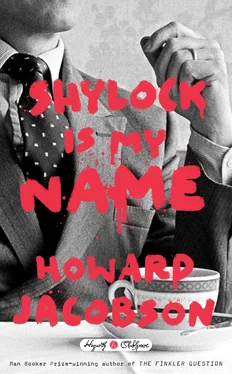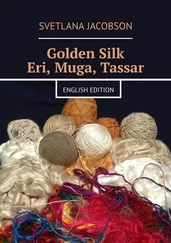Well, if villainy was all the Gentiles saw, villainy would be what he’d show them more of.
And they? They would show him villainous mercy, dropping like poison rain, in return.
Does that mean he was ironic-referencing villainy?
And does that mean they were ironic-referencing mercy?
One thing he knew: they hadn’t ironic-referenced stealing his daughter.
—
“I love Beatrice,” Howsome said, tightening and then loosening his tie. Beneath his collar the green and scarlet dragon writhed.
“She’s sixteen.”
“Like that’s some big deal,” Beatrice said.
Howsome looked from one to the other, wanting to agree with both.
“ Sixteen !” Strulovitch repeated.
“Play another tune, Daddy,” Beatrice said, “you’ve been harping on about how old I am since I was born. She’s thirteen. She’s fourteen. She’s fifteen . You’ll still be saying it when I’m sixty.”
“At sixty you’ll have seen something of the world, and I won’t be here.”
“Me neither,” Howsome said, which Beatrice’s expression told him was ill-advised. You don’t stress age difference when you’re trying to prise a daughter from a parent.
It’s time, Strulovitch thought, I spoke to my daughter’s suitor in the old way — without the daughter present.
“Beatrice, you are making both of us uncomfortable,” he told her. “Why don’t you leave us for a little while. I promise I won’t offer Mr. Howsome money to disappear from the country.”
Which only went to show he’d thought of doing precisely that.
“There is no sum of money that would make me part with Beatrice, sir,” Howsome said.
Beatrice rose and smiled at him. Good boy. Good answer. She could see her father thought so too. “I’ll make tea then,” she said, feeling confident. “And don’t be horrible to him in other ways either, Daddy.”
Such as what? Strulovitch thought.
“I want my daughter,” he said, when Beatrice had left them, “to finish her education.”
What he really meant was I want my daughter to start her education, but now was not the time to be discussing the merits of performance art.
“I want the same for her,” Howsome said.
Strulovitch nodded. Good answer again. He could see what his daughter liked in the man. He was compliant. He made good use of the few words he possessed. He had a gentle smile, despite his bulk. And even his bulk — at least as he had disposed it among the soft fabrics of Strulovitch’s sofa — was more protective than aggressive. What else she saw in him — whether or not he was sexually attractive — was a question that exceeded Strulovitch’s fatherly brief. A man should not put his mind to what arouses his daughter, no matter that Strulovitch had put his mind to little else since Beatrice turned whatever age it was when he first knew her to be in danger.
Now sixteen, she was old enough — not legally, no, but in society’s eyes, and certainly in her own — to decide for herself. But he’d got her to this age without serious mishap, hadn’t he? He’d navigated the dangers for her. Maybe she was secretly grateful to him for that. Maybe it wasn’t only to avoid upsetting her poor vegetating mother that she didn’t just up and go. Maybe she loved him too, and wanted his love in return. But since she had stayed, and was suddenly playing at being an old-fashioned daughter, wanting Daddy’s blessing, he would go on playing the old-fashioned father.
“What else do you want for her?” he continued, looking hard into the footballer’s swimming eyes.
Howsome was puzzled, on the lookout for trick questions. Daddy’s devious, Beatrice had warned him. Be careful.
“In what sense?” he asked. “Do you mean like children?”
“Good God, no. Not yet. She’s sixteen for Christ’s sake. But you want her to be happy, I presume.”
“Obviously.”
It was a footballer’s word. “Obviously.” At the end of the day. At the end of the day, obviously, I want your daughter to be happy in the back of the net.
“And you want her to make her parents happy?”
That was less obvious, but Howsome acceded to it anyway. “Obviously,” he said. He even nodded, Strulovitch thought, upstairs in the direction of poor Kay, as though he knew what had befallen her and where she was kept. And therefore as though he knew that this imposed a still greater obligation on him to look after Beatrice.
“You will understand then that the fact you’ve been married several times before doesn’t make us entirely happy. In fact it makes us anxious.”
He was glad Beatrice had left them. Who’s this us suddenly, he could imagine her thinking.
“I made some silly errors,” Howsome admitted. “I was young and had more money than sense. I am a different man now. In fact I’m a man now, full stop. I was a boy then.”
Strulovitch nodded, not listening. He was preparing the only question that mattered. “You know, of course,” he said, taking his time, “that ours is a Jewish family.”
“I love Jews,” Howsome said, bringing his body to the edge of the sofa. He loved Jews so much he was prepared to fall at their feet. “In fact…”
He stopped. He was about to say that the proof of his love of Jews was his having already married one, but decided in the nick of time not to. Jews appreciate being liked, but not collected, Beatrice had explained when he’d first tried wooing her with the line that she was not the first Jew he’d loved.
“…in fact,” he went on, “I’ve read many books on the subject.”
Remembering the Nazi salute, Strulovitch tried not to picture the contents of Howsome’s bookshelves. The Protocols of the Elders of Zion? Der ewige Jude ? Bound copies of the Guardian ?
“We make interesting reading,” he allowed.
Howsome wanted to go further than that. “The Jews are wonderful people.”
“Some of us,” Strulovitch agreed.
Howsome had the look of one who had said all he had to say, had conclusively proved his suitability, and now awaited the go-ahead to carry Beatrice off to his bed.
But Strulovitch was not quite finished. “Since you know so much about us,” he said, “you will know that we worry when our children fly the coop. I don’t just mean leave home but, you know, leave the…clan.”
A funny word “clan,” but he couldn’t say religion. Religion wasn’t what he meant. It hadn’t been in the name of religion that his father had buried him when he married out. What was it then? Faith? No, not that. And he couldn’t say tribe. He’d heard Shylock fulminating against tribe. Culture? Too secular. If culture was all it was about, why the worry? So he let “clan” hang there, a poor substitute for a word he couldn’t find.
Too late he remembered covenant.
“I so respect that,” Howsome said. “And obviously I wouldn’t expect Beatrice to stop being Jewish.”
“That’s good of you,” Strulovitch said sarcastically. He marvelled at the magnanimity of his prospective son-in-law, a man who was happy to take Jewish women as he found them. “If nothing else, young man,” Strulovitch thought about saying, “it sits smiling to my heart to know that the future of the Jewish people is secure in your benign consideration.” But he held back. Why waste irony? Howsome was doing his best, considering the circles he’d been known to move in.
“If you eventually give your permission she can even keep her name,” Howsome said.
“Beatrice?”
“No, her other name.”
“Again that’s good of you,” Strulovitch said. “I think she’ll be relieved to know that. But this isn’t quite what I’ve been getting at.”
The footballer apologised. “I’m sorry, I thought that was what you wanted to hear.”
Читать дальше












